爱默生—美国学者—中英译文
- 格式:doc
- 大小:137.50 KB
- 文档页数:27
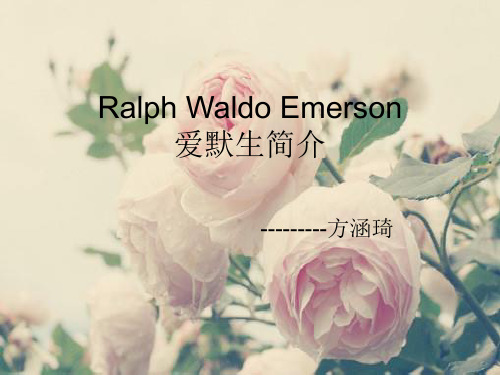
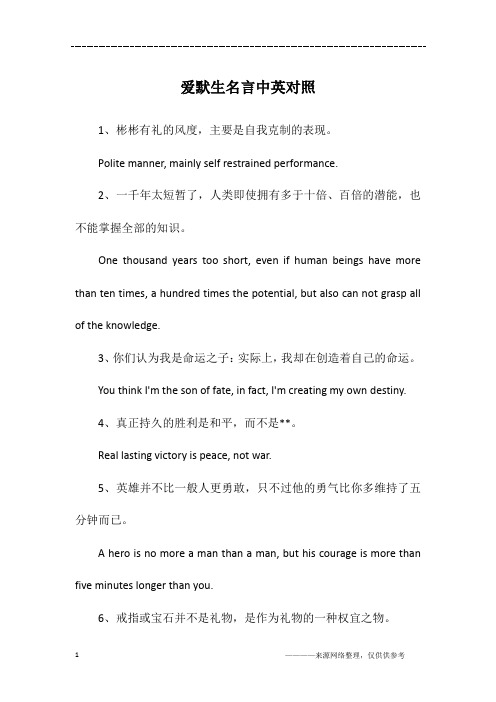
爱默生名言中英对照1、彬彬有礼的风度,主要是自我克制的表现。
Polite manner, mainly self restrained performance.2、一千年太短暂了,人类即使拥有多于十倍、百倍的潜能,也不能掌握全部的知识。
One thousand years too short, even if human beings have more than ten times, a hundred times the potential, but also can not grasp all of the knowledge.3、你们认为我是命运之子:实际上,我却在创造着自己的命运。
You think I'm the son of fate, in fact, I'm creating my own destiny.4、真正持久的胜利是和平,而不是**。
Real lasting victory is peace, not war.5、英雄并不比一般人更勇敢,只不过他的勇气比你多维持了五分钟而已。
A hero is no more a man than a man, but his courage is more than five minutes longer than you.6、戒指或宝石并不是礼物,是作为礼物的一种权宜之物。
Ring or gem is not a gift, as a gift of expediency.7、无论真理在何受到伤害,都应去扞卫它。
No matter where the truth hurts, should go to defend it.8、智慧的可靠标志就是能够在平凡中发现奇迹。
The reliable mark of wisdom is to discover the miracle in the ordinary.9、如果我们用片面的方法阅读书籍,那么我们得到的就会是片面的知识。

Beauty(爱默生)译文Beauty问世间美为何物Ralph Waldo Emerson 拉尔夫·瓦尔多·爱默生from Nature, published as part of Nature; Addresses and Lectures节选自《论自然》(收录于《论自然演讲集》)Not less excellent, except for our less susceptibility in the afternoon, was the charm, 昨日傍晚,落日熔金,暮云合璧,一月的黄昏美景依旧,last evening, of a January sunset. The western clouds divided and subdivided然而毕竟薄暮,倦意袭人,难以抵挡。
themselves into pink flakes modulated with tints of unspeakable softness; and the air 西云漫卷,幻化万千,粉霞片片,糅杂着无法言喻的柔和色彩;had so much life and sweetness, that it was a pain to come within doors. What was it 空气中有暗香浮动,氤氲着蓬勃的生息,叫人流连忘返,不忍归家。
that nature would say? Was there no meaning in the live repose of the valley behind 大自然喃喃低语,不知所言为何?磨坊后的溪谷,鲜活如许,静谧如许,the mill, and which Homer or Shakspeare could not reform for me in words? The纵有荷翁莎翁的生花妙笔,恐亦难绘其万一。
此情此景,岂无殊意!leafless trees become spires of flame in the sunset, with the blue east for their遥望东际,天幕蔚蓝,下有萧萧落木,映衬着斜阳晚照,恍惚似燃烧的尖塔,back-ground, and the stars of the dead calices offlowers, and every withered stem and 花瓣凋零,点点如繁星坠落,枝茎摧折,残株凝霜,stubble rimed with frost, contribute something to the mute music.这一切,共谱出无声的乐章。

Ralph Waldo Emerson (May 25, 1803 – April 27,1882) was anAmerican philosopher, essayist, and poet, best remembered forleading the Transcendentalist movement of the mid-19thcentury. His teachings directly influenced the growing NewThought movement of the mid-1800s. He was seen as a champion of individualism and a prescientcritic of the counterva iling pressures of society.Emerson gradually moved away from the religious and social beliefs of his contemporarie s,formulating and expressing the philosophy of Transcendentalism in his 1836 essay, Nat ure. As aresult of this ground-breaking work he gave a speech entitled The American Scholar in 1837, whichOliver Wen dell Holmes, Sr. considered to be America's "Intellectual Declaration of Independence".C onsidered one of the great orators of the time, Emerson's enthusiasm and respect for his audience enraptured crowds. His support for abolitionism late in life created controversy, and attimes he was subject to abuse from crowds while speaking on the topic. When ask ed to sum uphis work, he said his central doctrine was "the infinitude of the private man. "Literary career and TranscendentalismEmerson and other like-minded intellectuals founded the Transcendental Club, which served as acenter for the m ovement. Its first official meeting was held on September 19,1836. Emersonanonymously published his first essay, Nature, in September 1836. A year later, on August 31, 1837, Emerson delivered his now-famous Phi Beta Kappa address, "The American Scholar", thenknown as "An Oration, Delivered before the Phi Beta Kappa Society at Cambridge"; it was renamedfor a collection of essays in 1849. In the speech, Emerson declared literary independence in theUnited States and urged Americans to crea te a writing style all their own and free from Europe.James Russell Lowell, who was a stu dent at Harvard at the time, called it "an event without formerparallel on our literary ann als". Another member of the audience, Reverend John Pierce, called it"an apparently inco herent and unintelligible address".In 1837, Emerson befriended Henry David Thoreau. Though they had likely met as early as 1835,in the fall of 1837, Emerson asked Thoreau,"Do you keep a journal?" The question went on tohave a lifelong inspiration for Thoreau.On July 15,1838, Emerson was invited to Divinity Hall, Harvard Divinity School for the school'sgradu ation address, which came to be known as his "Divinity School Address". Emersondiscoun ted Biblical miracles and proclaimed that, while Jesus was a great man, he was not God: historical Christianity, he said, had turned Jesus into a "demigod, as the Orientals or the Greekswould describe Osiris or Apollo". His comments outraged the establishment and th e generalProtestant community. For this, he was denounced as an atheist, and a poisone r of young men'sminds. Despite the roar of critics, he made no reply, leaving others to p ut forward a defense. Hewas not invited back to speak at Harvard for another thirty year s.The Transcendental group began to publish its flagship journal, The Dial, in July 1840.Th ey plannedthe journal as early as October 1839, but work did not begin until the first we ek of 1840.GeorgeRipley was its managing editor and Margaret Fuller was its first editor, having been hand-chosen byEmerson after several others had declined the role. Fuller stayed on for about t wo years andEmerson took over, utilizing the journal to promote talented young writers i ncluding ElleryChanning and Thoreau.It was in 1841 that Emerson published Essays, his second book, which included the famo us essay, "Self-Reliance". His aunt called it a "strange medley of atheism and false independence", but it gained favorable reviews in London and Paris. This book, and its popular reception, more than anyof Emerson's contributions to date laid the groundwork for his international fam e.In January 1842 Emerson's first son Waldo died from scarlet fever. Emerson wrote of his grief inthe poem "Threnody"("For this losing is true dying"), and the essay "Experience". In the sameyear, William Ja mes was born, and Emerson agreed to be his godfather.Bronson Alcott announced his plans in November 1842 to find "a farm of a hundred acres inexcellent condition with good buildings, a good orchard and grounds". Charles Lane pu rchased a90-acre (360,000m2) farm in Harvard, Massachusetts, in May 1843 for what would becomeFruitlands, a co mmunity based on Utopian ideals inspired in part by Transcendentalism. The farmwould r un based on a communal effort, using no animals for labor; its participants would eat no meat and use no wool or leather. Emerson said he felt "sad at heart" for not engaging in theexperiment himself. Even so, he did not feel Fruitlands would be a success."Their whole doctrine isspiritual", he wrote,"but they always end with saying, Give us much land and money". Even Alcottadmitted h e was not prepared for the difficulty in operating Fruitlands."None of us were preparedto actualize practically the ideal life of which we dreamed. So we fell apart", he wrote. After itsfailure, Emerson helped buy a farm for Alcott's family in Concord which Alcott named "Hillside".The Dial ceased publication in April 1844; Horace Greeley reported it as an end to the "m ost originaland thoughtful periodical ever published in this country".Emerson made a living as a popular lecturer in New England and much of the rest of the country.From 1847 to 1848, he toured England, Scotland, and Ireland. He also visited Pa ris between theFebruary Revolution and the bloody June Days. When he arrived, he saw the stumps where treeshad been cut down to form barricades in the February riots. On May 21 he stood on the Champde Mars in the midst of mass celebrations for concord, pe ace and labor. He wrote in his journal: "Atthe end of the year we shall take account,& see if the Revolution was worth the trees."He had begun lecturing in 1833; by the 1850s he was giving as many as 80 per year. Em ersonspoke on a wide variety of subjects and many of his essays grew out of his lectures. He chargedbetween $10 and $50 for each appearance, bringing him about $800 to $1,00 0 per year. Hisearnings allowed him to expand his property, buying eleven acres of land by Walden Pond and afew more acres in a neighboring pine grove. He wrote that he was "landlord and waterlord of 14acres, more or less".In 1845, Emerson's journals show he was reading the Bhagavad Gita and Henry Thomas Colebrooke's Essays on the Vedas. Emerson was strongly influenced by the Vedas, and m uch ofhis writing has strong shades of nondualism. One of the clearest examples of this c an be found inhis essay "The Over-soul":We live in succession, in division, in parts, in particles. Meantime within man is the soul o f the whole;the wise silence; the universal beauty, to which every part and particle is equ ally related, the eternalONE. And this deep power in which we exist and whose beatitude is all accessible to us, is not onlyself-sufficing and perfect in every hour, but the act of seeing and the thing seen, the seer an d thespectacle, the subject and the object, are one. We see the world piece by piece, as the sun, themoon, the animal, the tree; but the whole, of which these are shining parts, i s the soul.Emerson was introduced to Indian philosophy when reading the works of French philosop herVictor Cousin.In February 1852 Emerson and James Freeman Clarke and William Henry Channing edite d anedition of the works and letters of Margaret Fuller, who had died in 1850. Within a w eek of herdeath, her New York editor Horace Greeley suggested to Emerson that a biogr aphy of Fuller, to becalled Margaret and Her Friends, be prepared quickly "before the int erest excited by her saddecease has passed away". Published with the title The Memoirs of Margaret Fuller Ossoli, Fuller'swords were heavily censored or rewritten. The three edi tors were not concerned about accuracy;they believed public interest in Fuller was tempo rary and that she would not survive as a historicalfigure. Even so, for a time, it was the b est-selling biography of the decade and went throughthirteen editions before the end of the century.Walt Whitman published the innovative poetry collection Leaves of Grass in 1855 and sen t a copyto Emerson for his opinion. Emerson responded positively, sending a flattering fiv e-page letter as aresponse. Emerson's approval helped the first edition of Leaves of Grass s tir up significant interestand convinced Whitman to issue a second edition shortly thereaf ter. This edition quoted a phrasefrom Emerson's letter, printed in gold leaf on the cover: "I Greet You at the Beginning of a GreatCareer". Emerson took offense that this letter wa s made public and later became more critical ofthe work.LegacyAs a lecturer and orator, Emerson—nicknamed the Concord Sage—became the leading voice ofintellectual culture in the United States. Herman Melville, wh o had met Emerson in 1849, originallythought he had "a defect in the region of the heart " and a "self-conceit so intensely intellectual thatat first one hesitates to call it by its right name", thou gh he later admitted Emerson was "a greatman". Theodore Parker, a minister and Transc endentalist, noted Emerson's ability to influence andinspire others:"the brilliant genius of Emerson rose in the winter nights, and hung over Boston,drawing the eyes of ingenuous young people to look up to that great new start, a beauty and am ystery, which charmed for the moment, while it gave also perennial inspiration, as it led t hemforward along new paths, and towards new hopes".In his book The American Religion, Harold Bloom repeatedly refers to Emerson as "The p rophet ofthe American Religion," which in the context of the book refers to indigenously American andgnostic-tinged religions such as Mormonism and Christian Science that arose largely in Emerson's lifetime. In The Western Canon, Harold Bloom compares Emerson to Michel de Montaign e:"Theonly equivalent reading experience that I know is to reread endlessly in the noteboo ks and journalsof Ralph Waldo Emerson, the American version of Montaigne."In May 2006,168 years after Emerson delivered his "Divinity School Address," Harvard DivinitySchool a nnounced the establishment of the Emerson Unitarian Universalist AssociationProfessorsh ip. Harvard has also named a building, Emerson Hall (1900), after him.Emerson Hill, a neighborhood in the New York City borough of Staten Island is named for his eldestbrother, Judge William Emerson, who resided there from 1837 to 1864.。
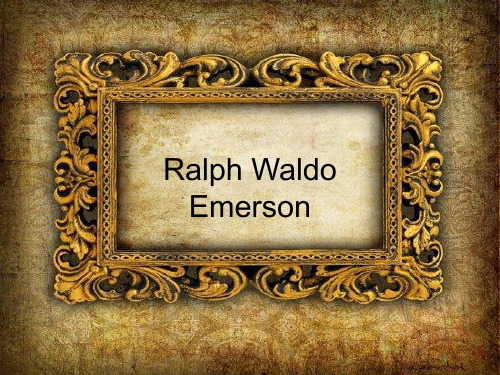

用爱默生《论美国学者》观点分析儒家思想(中英双语)The similarities of Transcendentalism and Confucianism---Analyze Confucianism with Emerson’s idea from The American ScholarRalph Waldo Emerson was a major American poet, philosopher and center of the American Transcendental movement. The idea he expressed in his great work The American Scholar played an integral role in establishing the American scholar and the American spirit of individualism. Also in Chinese Spring and Autumn Period, Confucius and Mencius, two Confucianism philosophers, intended to influence people’s attitude and lives with their thoughts--- Confucianism, which at some extent have a connection with Transcendentalism.First, both emphasized the importance of human beings. Emerson believed “the world is noting, the man is all.” He regarded men as the main part of society, thus the innovation of society called for human beings’self-improvement and self-reliance. So did confucians. In their opinions, men were equal. The ruler should be benevolent and righteous towards the masses. The essence of transcendentalism was individualism, which meant one must establish a central system which break of the of God. In china, there was no God, confucians thus held that men ought to be ruled by men. In this way, the society may be developed. Emerson once said: “we will walk on our own feet, we will work with our own hands; we will speak our own minds…. Confucians asserted the identity of human nature, and they thought; “all men are born identical but the circumstance makes them different”. In this aspect, Emerson and confucians were fabulous identical.Second, these two thoughts all advocated people emancipate their minds. “The scholar is that man who must take up into himself all the ability of the time, all the contributions of the past, all the hopes of the future. He must be a university of knowledge.” Emerson hoped all American scholars do not imitate European culture but form their own ideas. He believed himself inspired by the Divine Soul which also inspired all men, that was to mean, men can improve themselves by communicating with Divine Soul.; He believed “it is for you to know all; it is for you to dare all.” A nd confucians advocated equality between teachers and students and encourage students to form opinion of their own. Obviously, these ideas had a great influence on beings’ education.Third, they had the similar views on the material lives. Confucians advocated moderation; they maintained that there was no necessary to chase luxury, and moral fidelity should be promoted. Emerson upheld spirit; he believed in miracle, in the perpetual openness of the human mind to new influx of light and power; in stead of pursuing material wealth, men needed depend on themselves to enrich their minds.On the whole, both transcendentalism and confucianism attached great importance on each country. Transcendentalism pushed the American literature into a flourishing period; confucianism had dominated a feudal society that in essence lasted 2,000 years, and for that reason its influence over history, social structure and the people of China cannot be overlooked.超验主义与儒家思想的相同点----用爱默生《论美国学者》观点分析儒家思想拉尔夫·瓦尔多·爱默生是美国著名诗人,哲学家以及美国超验主义运动的领导人物。

爱默生励志名言中英对照无论真理在何受到伤害,都应去扞卫它,下面由就由为大家整理的爱默生励志名言中英对照,欢迎大家阅读!1、彬彬有礼的风度,主要是自我克制的表现。
Polite manner, mainly self restrained performance.2、一千年太短暂了,人类即使拥有多于十倍、百倍的潜能,也不能掌握全部的知识。
One thousand years too short, even if human beings have more than ten times, a hundred times the potential, but also can not grasp all of the knowledge.3、你们认为我是命运之子:实际上,我却在创造着自己的命运。
You think I'm the son of fate, in fact, I'm creating my own destiny.4、真正持久的胜利是和平,而不是战争。
Real lasting victory is peace, not war.5、英雄并不比一般人更勇敢,只不过他的勇气比你多维持了五分钟而已。
A hero is no more a man than a man, but his courage is more than five minutes longer than you.6、戒指或宝石并不是礼物,是作为礼物的一种权宜之物。
Ring or gem is not a gift, as a gift of expediency.7、无论真理在何受到伤害,都应去扞卫它。
No matter where the truth hurts, should go to defend it.8、智慧的可靠标志就是能够在平凡中发现奇迹。
The reliable mark of wisdom is to discover the miracle in the ordinary.9、如果我们用片面的方法阅读书籍,那么我们得到的就会是片面的知识。

爱默生名言中英对照导读:1、彬彬有礼的风度,主要是自我克制的表现。
Polite manner, mainly self restrained performance.2、一千年太短暂了,人类即使拥有多于十倍、百倍的潜能,也不能掌握全部的知识。
One thousand years too short, even if human beings have more than ten times, a hundred times the potential, but also can not grasp all of the knowledge.3、你们认为我是命运之子:实际上,我却在创造着自己的命运。
You think I'm the son of fate, in fact, I'm creating my own destiny.4、真正持久的胜利是和平,而不是**。
Real lasting victory is peace, not war.5、英雄并不比一般人更勇敢,只不过他的勇气比你多维持了五分钟而已。
A hero is no more a man than a man, but his courage is more than five minutes longer than you.6、戒指或宝石并不是礼物,是作为礼物的一种权宜之物。
Ring or gem is not a gift, as a gift of expediency.7、无论真理在何受到伤害,都应去扞卫它。
No matter where the truth hurts, should go to defend it.8、智慧的可靠标志就是能够在平凡中发现奇迹。
The reliable mark of wisdom is to discover the miracle in the ordinary.9、如果我们用片面的方法阅读书籍,那么我们得到的就会是片面的知识。
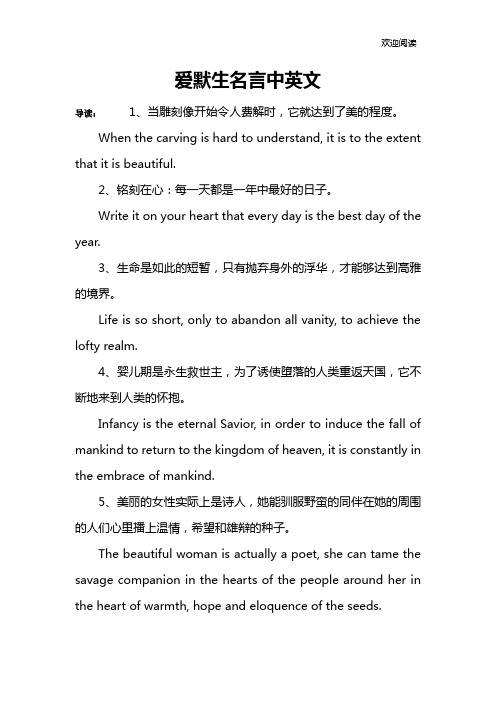
爱默生名言中英文导读:1、当雕刻像开始令人费解时,它就达到了美的程度。
When the carving is hard to understand, it is to the extent that it is beautiful.2、铭刻在心:每一天都是一年中最好的日子。
Write it on your heart that every day is the best day of the year.3、生命是如此的短暂,只有抛弃身外的浮华,才能够达到高雅的境界。
Life is so short, only to abandon all vanity, to achieve the lofty realm.4、婴儿期是永生救世主,为了诱使堕落的人类重返天国,它不断地来到人类的怀抱。
Infancy is the eternal Savior, in order to induce the fall of mankind to return to the kingdom of heaven, it is constantly in the embrace of mankind.5、美丽的女性实际上是诗人,她能驯服野蛮的同伴在她的周围的人们心里播上温情,希望和雄辩的种子。
The beautiful woman is actually a poet, she can tame the savage companion in the hearts of the people around her in the heart of warmth, hope and eloquence of the seeds.6、品格是一种内在的力量,它的存在能直接发挥作用,而无需借助任何手段。
Character is a kind of inner strength, its existence can playa direct role, without the aid of any means.7、不要在意别人的嘲弄,也不要在意会被别人打败。
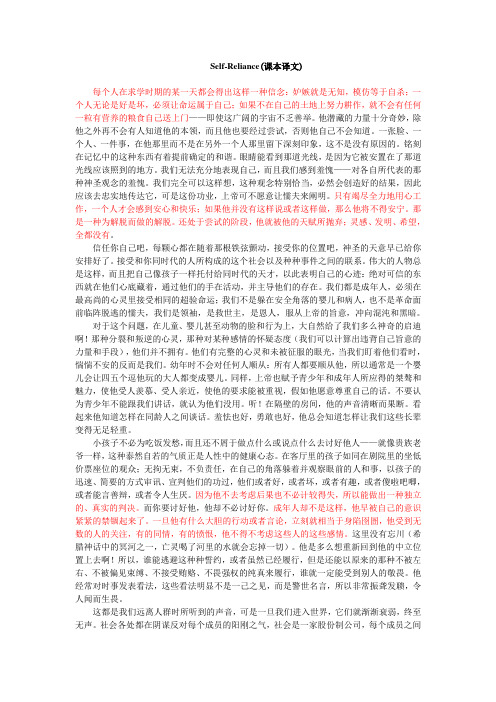
Self-Reliance(课本译文)每个人在求学时期的某一天都会得出这样一种信念:妒嫉就是无知,模仿等于自杀;一个人无论是好是坏,必须让命运属于自己;如果不在自己的土地上努力耕作,就不会有任何一粒有营养的粮食自己送上门——即使这广阔的宇宙不乏善举。
他潜藏的力量十分奇妙,除他之外再不会有人知道他的本领,而且他也要经过尝试,否则他自己不会知道。
一张脸、一个人、一件事,在他那里而不是在另外一个人那里留下深刻印象,这不是没有原因的。
铭刻在记忆中的这种东西有着提前确定的和谐。
眼睛能看到那道光线,是因为它被安置在了那道光线应该照到的地方。
我们无法充分地表现自己,而且我们感到羞愧——对各自所代表的那种神圣观念的羞愧。
我们完全可以这样想,这种观念特别恰当,必然会创造好的结果,因此应该去忠实地传达它,可是这份功业,上帝可不愿意让懦夫来阐明。
只有竭尽全力地用心工作,一个人才会感到安心和快乐;如果他并没有这样说或者这样做,那么他将不得安宁。
那是一种为解脱而做的解脱。
还处于尝试的阶段,他就被他的天赋所抛弃;灵感、发明、希望,全都没有。
信任你自己吧,每颗心都在随着那根铁弦颤动,接受你的位置吧,神圣的天意早已给你安排好了。
接受和你同时代的人所构成的这个社会以及种种事件之间的联系。
伟大的人物总是这样,而且把自己像孩子一样托付给同时代的天才,以此表明自己的心迹:绝对可信的东西就在他们心底藏着,通过他们的手在活动,并主导他们的存在。
我们都是成年人,必须在最高尚的心灵里接受相同的超验命运;我们不是躲在安全角落的婴儿和病人,也不是革命面前临阵脱逃的懦夫,我们是领袖,是救世主,是恩人,服从上帝的旨意,冲向混沌和黑暗。
对于这个问题,在儿童、婴儿甚至动物的脸和行为上,大自然给了我们多么神奇的启迪啊!那种分裂和叛逆的心灵,那种对某种感情的怀疑态度(我们可以计算出违背自己旨意的力量和手段),他们并不拥有。
他们有完整的心灵和未被征服的眼光,当我们盯着他们看时,惴惴不安的反而是我们。

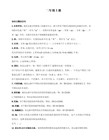
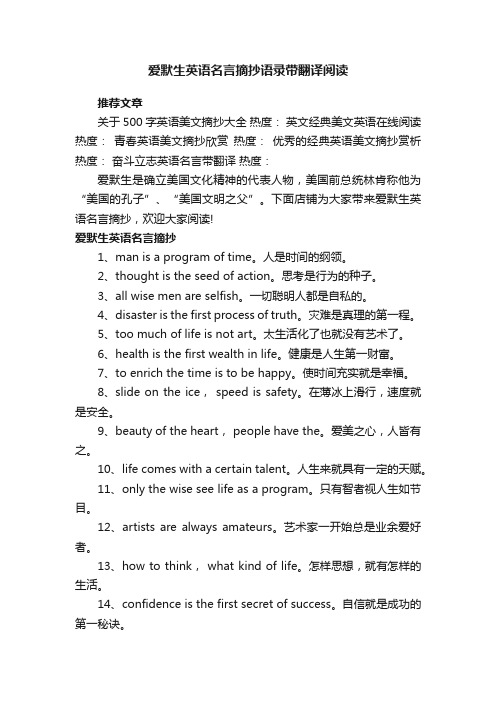
爱默生英语名言摘抄语录带翻译阅读推荐文章关于500字英语美文摘抄大全热度:英文经典美文英语在线阅读热度:青春英语美文摘抄欣赏热度:优秀的经典英语美文摘抄赏析热度:奋斗立志英语名言带翻译热度:爱默生是确立美国文化精神的代表人物,美国前总统林肯称他为“美国的孔子”、“美国文明之父”。
下面店铺为大家带来爱默生英语名言摘抄,欢迎大家阅读!爱默生英语名言摘抄1、man is a program of time。
人是时间的纲领。
2、thought is the seed of action。
思考是行为的种子。
3、all wise men are selfish。
一切聪明人都是自私的。
4、disaster is the first process of truth。
灾难是真理的第一程。
5、too much of life is not art。
太生活化了也就没有艺术了。
6、health is the first wealth in life。
健康是人生第一财富。
7、to enrich the time is to be happy。
使时间充实就是幸福。
8、slide on the ice, speed is safety。
在薄冰上滑行,速度就是安全。
9、beauty of the heart, people have the。
爱美之心,人皆有之。
10、life comes with a certain talent。
人生来就具有一定的天赋。
11、only the wise see life as a program。
只有智者视人生如节目。
12、artists are always amateurs。
艺术家一开始总是业余爱好者。
13、how to think, what kind of life。
怎样思想,就有怎样的生活。
14、confidence is the first secret of success。

爱默生经典语录中英文导读:本文是关于爱默生经典语录中英文,如果觉得很不错,欢迎点评和分享!1、智力取消了命运,只要一个人在思考,他就是自主的。
Intelligence cancels the destiny, so long as a person is thinking, he is independent.2、我们做某件事最终总是要付出代价的,因为,社会组织机构总是凌驾于每个人的个性之上的。
We do something at the end of the time, because the social organization is always superior to everyone's personality.3、自尊是伟大的前提,那些言行一致、表里如一的人,可以超脱于命运之上,可以向命运夸口。
Self esteem is a great premise, those words, people can be detached to be the same outside and inside, the fate of the above, can boast to fate.4、娱乐是花,务实是根。
如果要欣赏花的美丽,必须先加强根的牢固。
Entertainment is a flower, pragmatic is the root. If you want to appreciate the beauty of flowers, you must first strengthen the root of the firm.5、谁诅咒命运,谁就是软弱而堕落的人。
Who is the curse of fate, who is weak and corrupt.6、诚实的人必须对自己守信,他的最后靠山就是真诚。
Honest and trustworthy person must own, his last patron is sincere.7、有哪个人采取了行动而没有成为行动的受害者和奴隶呢?Is there a man who has acted without being a victim or a slave?8、头脑清醒的时候,书就会像闲物一样被搁置一旁。

主席先生,先生们:在开始第二个文学年之际,我谨向你们致意。
我们过去的一周年是充满希望的,但也许是努力尚且不够的一年。
我们相聚不是为了如古西腊人那样,进行力量和技巧的较量,朗诵过往历史,悲剧或颂词,也不是为了像中世纪行吟诗人那样为爱情和诗歌而聚集,更不是如当代在英国和欧洲的都市里为科学的进步举行聚会。
目前为止,我们聚会的节日还仅仅是一个良好的象征,它象征着我们由于忙碌而无心于文字的人民中对文学之爱的延续。
就此而言,这个象征弥足珍贵,有如不能被损毁的人类本能。
也许这样的时代已经到来,我们的聚会就要也应该是另番模样。
在这样的时代里,这个大陆的沉睡的心智睁开惺松睡眼,它给这世界带来久已期盼的贡献,这贡献远胜于机械性的技巧的发明。
我们依赖于人的日子,我们心智向其他大陆智慧学习的学徒期,这一切就要结束了。
成百万簇拥着我们涌向生活的同胞,他们不可能永远的满足于食用异国智慧收获的陈粮。
全新的事件和行动正在发生,这一切需要被歌唱,它们也要歌唱自己。
有谁会怀疑,诗歌将会获得新生,并将引领一个新时代?就如天文学家所预言,在我们的天穹之顶的天琴大星将会成为恒艮千年的新北极星。
就是抱有这样的期望,我接受这个讲演题目--不仅是在用词上,而是由于时代和我们组织的性质所决定的--美国学者。
时光流转,我们又翻开它传记的新篇章。
让我们来探询,新的时代和事件,在它特质上和对它的期望里又添了什么光色。
有这样一个久远不可考的传说--它有着我们意想不到的智慧。
起初,众神将一个人分为众人,使他可以更好的自助,如同要分出手指以便更好的使用手一样。
这古老的传说蕴涵着一个长新而高尚的信念。
这就是:有这么一个大写的人,你可以在某些个体的人或通过一种能力看到部分的他,但只有观照整个社会才能找到他的全部。
这个大写的人不是农夫,不是一个教授或着工程师,他是他们的总和。
这个人是传教士,他是学者,他是政治家,他是生产者也是战士。
这些功能在分工的社会形态里被一一分予不同的个体。

这篇〈自然〉选自爱氏第一讲演集。
它也是一篇经典。
与美国学者对照,就可以基本了解爱默生关于人关于自然的信念了。
之所以不说理论二字,因为他把这种信念,做为一切关于个体人论的起点,这,就算他自我无需证明的公设吧。
他认为,自然与人的关系是对应的,自然是美丽而善意的,人的自性也必如此。
这就是他用他那震撼人心的语言如此鼓吹绝对自由思维的出发点—-绝对信赖个体人,就如同绝对地依赖,信赖我们的自然一样。
请注意,在这个信念里没有谁轻谁重的问题,也没有逻辑的先后。
这是在逻辑之前的信念.如果对照中国教育最基本的设想:人的头脑是需要加以灌输的,自由思维是不可信赖的,其实是从根本上对人的自我否定,无论出于何种目的,源于什么文化传统,与爱默生倡导并为美国教育体系从小学开始,直到人的一生所实践的,又何止是南辕北辙。
我的一位美国同事,神秘地对我说:未来属于中国。
我只有摇头。
她哪里知道,在美国,整个社会是在培养着人,他有全部的力量去行动,自由的发挥着天赋.而中国,却还是在孜孜不倦地造就工具,活的工具.这,又如何去竞争呢?一个是主动的社会人,他不惧怕任何变化,他创造着改进着他周围的环境,另一个是只能镶嵌在某个螺丝口径中的螺丝钉,在社会的挤压下,从根本上丧失了行动的力量。
作为生产者,也许后者有一定的优势,但是,那也就是跟在人后爬行的了。
这世界的未来属于创造,无论是产业,社会环境,更别说艺术了,甚至人本身,莫不如是。
我们的国家一天不从观念上改变对人的假设,那么要赶上所谓先进国家,就还是一句空话.还没有开始的竞争,就已经输了。
从爱默生扯到这里,已经是离题万里了。
然而在美国生活的时光,无时不在提醒着我,他们(美国人民)无须知道爱默生了,他们的生活,学习和实践,无处不渗透着爱氏的信念,对个体人的信念!请停止嘲笑所谓美国人的无知和愚蠢吧.当社会成为个体人信念的实践体时,这个力量是无可战胜的。
试译爱默生:<自然〉走入孤独,远离书斋,如同远离社会一样重要。

爱默生英文名言爱默生英文名言爱默生(Ralph Waldo Emerson)是19世纪美国最伟大的思想家之一,他的思想影响了许多人,被誉为美国思想的先驱。
他不仅仅是一位思想家,而是一个有着深刻见解的文学家和演说家。
以下是他的一些著名英文名言:1. “To be yourself in a world that is constantly trying to make you something else is the greatest accomplishment.”翻译:在一个不断试图让你成为别人的世界中保持自我,是最伟大的成就。
这句话告诉我们,要在这个世界上做一个独立自主的人,要坚守自我,不要总是被别人的看法所影响。
保持自我是一种伟大的品质,而不是一种缺点。
2. “For every minute you remain angry, you give up sixty seconds of peaceof mind.”翻译:每分钟你生气,你就失去了六十秒的内心平静。
这句话告诉我们,生气往往只会让事情更糟糕。
通过控制自己的情绪,我们可以减少内心的痛苦,保持平静的思考,找到更好的解决方案。
3. “What lies behind us and what lies before us are tiny matters compared to what lies within us.”翻译:相较于内心潜藏的东西,过去和未来的事情微不足道。
这句话告诉我们,每个人内心深处都隐藏着强大的力量和潜能。
只有在发掘自己的内心世界,并且相信自己拥有改变自己和世界的力量,我们才能实现自己的潜力。
4. “Success is not final, failur e is not fatal: it is the courage to continue that counts.”翻译:成功不是终点,失败也不致命:重要的是勇气、坚持下去。

美国文学作者和作品中英文名称翻译对照美国文学作者和作品中英文名称翻译对照1、Benjamin Franklin本杰明·富兰克林1706-1790A Modest Inquiry into the Nature and Necessity of a Paper Money;Poor Richard\'s Almanack穷查理历书;The Way to Wealth 致富之道;The Autobiography自传2、Thomas Paine托马斯·潘恩1737-1809The Case of the Officers of Excise税务员问题;Common Sense常识;American Crisis美国危机;Rights of Man人的权利:Downfall of Despotism专制体制的崩溃;The Age of Reason理性时代3、Philip Freneau菲利普·弗伦诺1752-1832The Rising Glory of America蒸蒸日上的美洲;The British Prison Ship英国囚船;To the Memory of the Brave Americans纪念美国勇士——同类诗中最佳;The Wild Honeysuckle野生的金银花;The Indian Burying Ground印第安人殡葬地4、Washington Irving华盛顿·欧文1783-1859A History of New York纽约的历史——美国人写的第一部诙谐文学杰作;The Sketch Book见闻札记The Legend of Sleepy Hollow 睡谷的传说——使之成为美国第一个获得国际声誉的作家;Bracebridge Hall布雷斯布里奇田庄;Talks of Travellers旅客谈;The Alhambra阿尔罕伯拉5、James Fenimore Cooper詹姆斯·费尼莫尔·库珀1789-1851The Spy间谍;The Pilot领航者;The Littlepage Manuscripts利特佩奇的手稿;Leatherstocking Tales皮裹腿故事集:The Pioneer拓荒者;The Last of Mohicans最后的莫希干人;The Prairie大草原;The Pathfinder探路者;The Deerslayer杀鹿者6、William Cullen Bryant威廉·柯伦·布莱恩特1794-1878The Poems1821/1932诗选:To a Waterfowl致水鸟——英语中最完美的短诗;Thanatopsis死亡随想——受墓园派影响; The Whitefooted Deer白蹄鹿;A Forest Hymn森林赋;The Flood of Years 似水流年7、Edgar Allan Poe埃德加·爱伦·坡1809-1849(以诗为诗;永为世人共赏的伟大抒情诗人——叶芝)T ales of the Grotesque and Arabesque怪诞奇异故事集;Tales故事集;The Fall of the House of Usher厄舍古屋的倒塌;Ligeia莱琪儿;Annabel Lee安娜贝尔·李——歌特风格;首开近代侦探小说先河,又是法国象征主义运动的源头Tamerlane and Other Poems帖木儿和其他诗;Al Araaf,Tamerlane and Minor Poems艾尔·阿拉夫,帖木儿和其他诗;The Raven and Other Poems乌鸦及其他诗:The Raven乌鸦;The City in the Sea 海城;Israfel 伊斯拉菲尔;To Hellen致海伦8、Ralf Waldo Emerson拉尔夫·沃尔多·爱默生1803-1882Essays散文集:Nature论自然——新英格兰超验主义者的宣言书;The American Scholar论美国学者;Divinity;The Oversoul论超灵;Self-reliance论自立;The Transcendentalist超验主义者;Representative Men代表人物;English Traits英国人的特征;School Address神学院演说Concord Hymn康考德颂;The Rhodo 杜鹃花;The Humble Bee野蜂;Days日子-首开自由诗之先河9.Nathaniel Hawthorne纳撒尼尔·霍桑1804-1864Twice-told Tales尽人皆知的故事;Mosses from an Old Manse 古屋青苔:Young Goodman Brown 年轻的古德曼·布朗;The Scarlet Letter红字;The House of the Seven Gables有七个尖角阁的房子——心理若们罗曼史;The Blithedale Romance福谷传奇;The Marble Faun玉石雕像10、Henry David Threau亨利·大卫·梭罗1817-1862Wadden,or Life in the Woods华腾湖或林中生活;Resistance to Civil Government/Civil Disobedience抵制公民政府;A Week on theConcord and Merrimack Rivers11、Walt Whitman沃尔特·惠特曼1819-1892Leaves of Grass草叶集:Song of the Broad-Axe阔斧之歌;I hear America Singing我听见美洲在歌唱;When Lilacs Lost in the Dooryard Bloom\'d小院丁香花开时;Democratic Vistas民主的前景;The Tramp and Strike Question流浪汉和罢工问题;Song of Myself自我之歌12、Herman Melville赫尔曼·梅尔维尔1819-1891Moby Dick/The White Whale莫比·迪克/白鲸;Typee泰比;Omoo奥穆;Mardi玛地;Redburn雷得本;White Jacket白外衣;Pierre皮尔埃;Piazza广场故事;Billy Budd比利·巴德13、Henry Wadsworth Longfellow亨利·沃兹沃思·朗费罗1807-1882The Song of Hiawatha海华沙之歌——美国人写的第一部印第安人史诗;Voices of the Night夜吟;Ballads and Other Poens民谣及其他诗;Belfry of Bruges and Other Poems布鲁茨的钟楼及其他诗;Tales of a Wayside Inn路边客栈的故事——诗集:An April Day 四月的一天/A Psalm of Life人生礼物/Paul Revere\'s Ride保罗·里维尔的夜奔;Evangeline伊凡吉琳;The Courtship of Miles Standish迈尔斯·斯坦迪什的求婚——叙事长诗;Poems on Slavery奴役篇——反蓄奴组诗14、John Greenleaf Whittier约翰·格林里夫·惠蒂埃1807-1892Poems Written During the Progress of the Abolition Question 废奴问题;Voice of Freedom自由之声;In War Time and Other Poems内战时期所作;Snow-Bound大雪封门;The Tent on the Beach and Other Poems海滩的帐篷;Ichabod艾卡博德;A Winter Idyl冬日田园诗15、Harriet Beecher Stowe哈丽特·比彻·斯托1811-1896Uncle Tom\'s Cabin汤姆叔叔的小屋;A Tale of the Great Dismal Swamp德雷德阴暗大沼地的故事片;The Minister\'s Wooing牧师的求婚;The Pearl of Orr\'s Island奥尔岛的珍珠;Oldtown Folks 老城的人们16、Frederick Douglass弗莱德里克·道格拉斯1817-1895Narrative of the Life of Frederick Douglass an American Slave 弗莱德里克·道格拉斯,一个美国黑人的自述/My Bondage and My Freedom我的枷锁与我的自由/The life and Time of Frederick Douglass弗莱德里克·道格拉斯的生平与时代17、Emily Dickinson埃米莉·迪金森1830-1886The Poems of Emily Dichenson埃米莉·迪金森诗集——"Tell all the truth and tell it slant"迂回曲折的,玄学的18、Mark Twain马克·吐温(Samuel Longhorne Clemens)——美国文学的一大里程碑The Celebrated Jumping Frog of Calaveras County加拉维拉县有名的跳蛙;The Innocent\'s Abroad傻瓜出国记;The Gilded Age镀金时代;The Adventures of Tom Sawyer汤姆·索耶历险记;The Prince and the Pauper王子与贫儿;The Adventures of Huckleberry Finn哈克贝利·费恩历险记;A Connecticut Yankee in King Arthur\'s Court 亚瑟王宫中的美国佬;The Tragedy of Pudd\'nhead Wilson傻瓜威尔逊;Personal Recollections of Joan of Arc冉·达克;The Man That Corrupted Hadleyburg败坏哈德莱堡的人How to Tell a Story怎样讲故事——对美国早期幽默文学的总结19、Francis Bret Harte哈特1836-1902The Luck of Roaring Camp咆哮营的幸运儿——乡土文学作家20、William Dean Howells 威廉·狄恩·豪威尔斯1837-1920The Rise of Silas Lapham赛拉斯·拉帕姆的发迹;A Modern Instance现代婚姻; A Hazard of Now Fortunes时来运转;A Traveller from Altruia从利他国来的旅客;Through the Eye of the Needle透过针眼——乌托邦小说;Criticism and Fiction;Novel-Writing and Novel-Reading小说创作与小说阅读21、Henry Adams享利·亚当斯1838-1918History of the United States During the Administration of Jefferson and Madison(历史著作);The Education of Henry Adams:An Autobiography享利·亚当斯的教育22、William James威廉·詹姆斯1842-1910(首提"意识流"理论)Principles of Psychology心理学原理;The Will to Believe信仰的意志;Pragmatism:A New Name for Some Old Ways of Thinking实用主义:某些旧思想方法的新名称;The Meaning of Truth真理的意义23、Henry James享利·詹姆斯1843-1916小说:Daisy Miller苔瑟·米乐;The Portrait of a Lady贵妇人画像;The Bostonians波士顿人;The Real Thing and Other Tales真货色及其他故事;The Wings of the Dove鸽翼;The Ambassadors 大使;The Golden Bowl金碗评论集:French Poets and Novelists法国诗人和小说家;Hawthorne霍桑;Partial Portraits不完全的画像;Notes and Reviews札记与评论;Art of Fiction and Other Essays小说艺术24、Ambrose Bierce安布罗斯·毕尔斯1842-1914?小品集:The Fiend\'s Deligh魔鬼的乐趣;Nuggests and Dust Panned out in California在加利福尼亚淘出的金块和金粉;Cobwebs from an Empty Skull来自空脑壳的蜘蛛网短篇小说集:Tales of Soldiers and Civilians军民故事;In the Midst of Life在人生中间;Can Such Things Be?这种事情可能吗?The Devil\'s Dictionary魔鬼词典(The Applicant申请者)25、Edward Bellamy爱德华·贝拉米1850-1898Looking Backward:2000-1887回顾:从2000看1887年;Equality平等;The Duke of Sockbridge:A Romance of Shay\'s Rebellion斯托克布里奇的公爵:雪司起义的故事;The Blindman\'s World and Other Stories育人的世界及其他26、Edwin Charles Markham马卡姆1852-1940The Man With the Hoe荷锄人27、Charles Waddell Chesnutt查尔斯·契斯纳特1858-1932The Conjure Woman巫女;The Wife of His Youth and Other Stories of the Color Line他青年时代的妻子(The Sheriff\'s Children 警长的儿女)(the pioneer of the color line);The Marrow of Tradition一脉相承28、Hamlin Garland汉姆林·加兰1860-1940Crumbling Idol崩溃的偶像(真实主义veritism);Man Travelled Roads大路(The Return of a Private三等兵归来);Rose of Ducher\'s Cooly荷兰人山谷中的露斯;A Son of the Middle Border 中部边地农家子29、O·Henry欧·享利(William Sidney Porter)1862-1910The Man Higher Up黄雀在后;Sixes and Sevens七上八下30、Edith Wharton伊迪斯·华顿1862-1937The House of Mirth欢乐之家;Ethan Frome;Bunner Sister班纳姐妹;The Age of Innocent天真时代;The Customs of the Country乡村习俗;A Backward Glance回首往事32、George Santayana桑塔亚那1863-1952Scepticism and Animal Faith怀疑主义与动物性信仰;The Realms Being存在诸领域(本质/物质/真理/精神领域:4卷)(Relativity of Knowledge);Three Philosphical Poets三大哲学诗人;Poems (A Minuet:On Reaching the Age of Fifty小步舞曲:五十书怀);The Last Puritan最后的清教徒33、William E·B Dubois 威廉·艾伯·杜波依斯1868-1963Souls of Black Folk黑人的灵魂(Of Booker T Washington and Others);The Suppression of the African Slave Trade into the USA 制止非洲奴隶贸易进入美国;The Philadephia Negro;John Brown;The Black Flame黑色的火焰(三部曲)34、Edgar Lee Masters埃德加·李·马斯特斯1868-1950A Book of Verse诗集;Maximilian马克西米连(诗集);Spoon River Anthology斯普恩河诗集(Lucinda Matlock鲁欣达·马物罗克)35、Edwin Arlington Robinson鲁宾逊1869-1935Captain Craig克雷格上尉——诗体小说;The Town Down the River河上的城镇;The Man Against the Sky衬托着天空的人;Avon\'s Harvest沃冯的收成;Collected Poems诗集36、Frank Norris弗兰克·诺里斯1870-1902Moran of the Lady Letty茱蒂夫人号上的莫兰(romantic);Mc-Teague麦克提格(naturalistic);The Epic of the Wheat(realistic)小麦诗史(The Octopus章鱼,The Pit小麦交易所);A Deal in Wheat and Other Stories of the Old and New West小麦交易所及其他新老西部故事37、Stephen Crane斯蒂芬·克莱恩1871-1900Magic:A Girl of the Streets街头女郎梅姬(美国文学史上首次站在同情立场上描写受辱妇女的悲惨命运);The Red Badge of Courage红色英勇勋章;The Open Boat小划子;The Bride Comes to Yellow Sky新娘来到黄天镇38、Theodore Dreiser西奥多·德莱塞1871-1945Sister Carrie嘉莉姐妹;Jennie Gerhardt珍妮姑娘;Trilogy of Desire欲望三部曲(Financer金融家,The Titan巨人,The Stoic);An American Tragedy美国的悲剧(被称为美国最伟大的小说);Nigger Jeff黑人杰弗39、Paul Laurence Dumbar保尔·劳伦斯·邓巴1872-1906We Wear the Mask我们带着面具他是美国第一个有成就的黑人诗人,被称为"黑种人的桂冠诗人"(Poet Laureate of the Negro Race)40、Jack London杰克·伦敦1876-1916The Son of the Wolf狼之子,The Call of the Wild野性的呼唤;The Sea-wolf海狼;White Fang白獠牙;The People of the Abyss 深渊中的人们;The Iron Heel铁蹄;Marti Eden马丁·伊登;How I become a Socialist我怎样成为社会党人;The War of the Classes阶级之间的战争;What Life Means to Me生命对我意味着什么;Revolution革命;Love of Life热爱生命;The Mexican墨西哥人;Under the Deck Awings在甲板的天蓬下41、Upton Sinclair厄普顿·辛克莱尔1878-1968Spring and Harvest春天与收获;The Jungle屠场(揭发黑幕运动的代表作家);King Coal煤炭大王;Oil石油;Boston波士顿;Dragon\'s Teeth龙齿42、Irving Babbitt欧文·白壁德1865-1933(新人文主义主要代表)Literature and the American College 文学与美国学院()要求恢复古典文学教学;The New Laokoon新拉奥孔;Rousseau and Romanticism卢梭与浪漫主义;Democracy and Leadership民主与领导;On being Creative 论创造性43、Villa Sibert Cather维拉·凯塞1873-1947O,Pioneers啊,先驱们;My Antonia我的安东尼亚;The Professor\'s House教授之家;Death Comes for the Archibishop大主教之死44、Gertrude Stein格特鲁德·斯坦因1874-1946The Autobiography of Alice B T oklas爱丽丝·托克拉斯的自传;Tender Button温柔的钮扣45、Robert Frest罗伯特·弗罗斯特1874-1963A Boy\'s Wish少年心愿;North of Boston波士顿之北(Mending Wall修墙,After Apple-picking 摘苹果之后);Mountain Interval山间(成熟阶段)(The Road Not taken没有选择的道路);West-running Brook西流的溪涧;A Further Range又一片牧场;A Witness Tree一株作证的树46、Sherwood Anderson舍伍德·安德森1876-1941Windy McPherson\'s Son饶舌的麦克斐逊的儿子;Marching Men前进中的人们;Mid-American Chants美国中部之歌;Winesburg,Ohio/The Book of the Grotesque俄亥俄州的温斯堡/畸人志;Poor White穷苦的白人;Many Marriages多种婚姻;Dark Laughter阴沉的笑声The Triumph of the Egg and Other Stories鸡蛋的胜利和其他故事;Death in the Woods and Other Stories林中之死及其他故事;I Want to Know Why我想知道为什么47、Carl Sandburg卡尔·桑德堡1878-1967Always the Young Stranger永远是陌生的年轻人s;In Reckless Ecstasy肆无忌惮的狂热;The Prairie Years草原的年代一、二;The War Years战争的年代(林肯传记);The American Songbag 美国歌袋;The People,Yes人民,好;Honey and Salt蜜与盐;Corn-huskers辗米机(Fog雾);Smoke and Steel烟与钢48、Wallace Stevens华莱士·史蒂文斯1879-1955Harmonium风琴;The Man With the Blue Guitar弹蓝吉他的人;Notes Toward a Supreme Fiction 关于最高虚构的札记(Peter Quince at the Clavier彼得·昆斯弹风琴;Sunday Morning礼拜天早晨);The Auroras of Autumn秋天的晨曦;Collected Poems诗集49、Henry Louis Mencken孟肯1880-1956Bernard Shaw:His Plays肖伯纳的戏剧;The Philosophy of Nietzche尼采的哲学;The American Language美车语言;Happy Days幸福的日子(自传三部曲);Newspaper Days新闻记者的岁月;Heathe Days倡导异端邪说的年代50、William Carlos Williams威廉·卡罗斯·威廉斯1883-1963收入Des Imagistes意像派(意像派的第一部诗选)诗集:Sour Grapes;Spring and All春;The Desert Music;The Journey of Love爱的历程;Collected Poems;Complete Poems;Collected Later Poems;Pictures from Brueghel布留盖尔的肖像;Paterson佩特森(5卷长诗);Asphodal,That Green Flower常青花日光兰(长诗)名诗:Red Wheelbarrow红色手推车;The Widow\'s Lament in Spring寡妇的春怨;The Dead Baby;The Sparrow ,to My Father麻雀-致父亲;Proletarian Portrait无产阶级画像(from An Early Martyr先驱);The Great American Novels伟大的美国小说;In the American Grain美国性格;Autobiography自传51、Sinclair Lewis辛克莱·刘易斯1885-1951(美国第一个获诺贝尔奖)Dur Mr Wrenn我们的雷恩先生;The Job求职;The Main Street大先进;Babbitt巴比特;Arrowsmith艾罗史密斯;Elmer Gantry艾尔默·甘特里;Dodsworth多兹沃斯;It can\'t Happen Here事情不会发生在这里;Kingsblood Royal王孙梦52、Ezra Pound艾兹拉·庞德1885-1972The Spirit of Romance罗曼司精神;The Anthology Des Imagistes意像派诗选;Cathay华夏(英译中国诗);Literary Essays文学论;Hugh Swlwyn Mauberley;A Few Don\'ts by Imagiste意像派戒条;Personage面具;Polite Essays文雅集;The Cantos of Ezra Pound庞德诗章(109首及8首未完成稿)53、Hilda Doolittle希尔达·杜丽特尔1886-1961Sea Garden海的花园;Collected Poems(Dread山精;Pear Tree;Orchard);The Walls Do Not Fall 墙没在倒塌(战争诗三部曲);Tribute to the Angels天使颂;The Flowering of the Rod柳条葳蕤;Tribute to Freud献给弗洛伊德;Hellen in Egypt海伦在伦敦(抒情长诗)54、Thomas Stearns Eliot托马斯·艾略特1888-1965Prufrock and Other Observations普罗夫洛克(荒原意识);The Waste Land荒原(The Burial of the Dead死者的葬礼;A Game of Chess弈棋;The Fire Sermon火诫;Death by Water水边之死;What the Thunder Said雷电之言);名诗:Ash Wednesday圣灰星期三;Four Quarters四个四重奏诗剧:Murder in the Cathedral大教堂谋杀案;Family Reunion 大团圆;Cocktail Party鸡尾酒会55、Eugene Oneil尤金·奥尼尔1888-1953独幕剧:Bound East to Cardiff东航卡迪夫;The Long Voyage Home归途迢迢;The Moon of the Carribbeans加勒比人之月; 多幕剧:Beyond the Horizon天边外(其成名作);Anna Christie安娜·克里斯蒂;The Emperor Jones琼斯皇;The Hairy Ape毛猿;All the God\'s Children Got Wings上帝的儿女都有翅膀The Great God Brown大神布朗;The Strange Interlude奇异的插曲;Mourning Becomes Electr素娥怨/悲悼a;The Iceman Cometh送冰的人来了;The Long Days Journey Into Night进入黑夜的漫长旅程/日长路远夜常深沉56、Katherine Anne Porter凯瑟琳·安·波特1890-1980Flowering Judas开花的紫荆花(Maria Conception;The Jitting of Granny Weatherall);Pale Horse,Pale Rider;Leaning Tower and Other Stories——TheCollected Stories of K A Porter Ship of Fools 愚人船(唯一的一部长篇小说);The Never Ending Wrong千古奇冤(回忆录)57、Archibald Mac Leish阿基博尔德·麦克利什1892-1982Towers of Ivory象牙塔;The Happy Marriage幸福的婚姻;Streets in the Moon月色中的街;New Found Land新发现的大陆;Conquistador新西班牙的征服者;Poems1912-1952 广播剧:The Fall of the City城市的陷落;Airraid空袭58、Michael Gold迈克尔·戈尔德1894-1967120 Million一亿二千万;Change The World改变世界;The Hollow Man空心人;Jews Without Money没在钱的犹太人(自传体小说)戏剧:Hoboken Blues;Fiesta节日;Battle Hymn歌;Prletarian Literature in the United States美国无产阶级文学选集(与人合编)59、E Cumings肯明斯1894-1962Tulips anddd Chimneys郁金香与烟囱;The Enormous Room大房间;XLI Poems诗41首;Viva万岁;No,Thanks不,谢谢;Collected Poems诗集;Eimi爱米(访苏游记)60、Edmund Wilson埃德蒙·威尔逊1895-1972Travel in Two Democracies在两个民主国家里旅行;T o the Finland Station到芬兰站去;A Piece of My Mind:Reflection at Sixty 心里话:行年六十的沉思;Axel\'s Castle阿克塞尔的城堡(象征主义批判的圭阜);The Ttriple Thinkers三重思想家;The Wound and The Bow创伤与箭;The Shores of Light光明之岸;The Fruits of the MLA 现代语言协会的成果61、John Dos Passos帕索斯1896-1970The Three Soldiers;Manhattan Transfer;U.S.A(The Forty-second Parallel;1919;The Big Money);District of Columbia哥伦比亚大区(The Adventures of a Young Man一个年轻人的冒险;Number One第一号;The Grand Design伟大的计划);Orient Express东方特别快车(游记)62、F Scott Fitzgerald弗朗西斯·菲茨杰拉德1896-1940(迷惘的一代)The Side of Paradise人间天堂;The Beautiful and the Damned美丽的和倒霉;The Great Gatsby了不起的盖茨比;Tender in the Night夜色温柔;The Last Tycoon最后的巨头短篇小说:Flappers and Philosophers姑娘们和哲学家们;Tales of the Jazz 爵士时代的故事;Taps at Reveille早晨的起床号→The Ice Palace冰宫;May Days五一节;The Diamond as Big as the Ritz像里茨饭店那样大的钻石;Winter Dreams冬天的梦;The Rich Boy富家子弟;Babylon Revisted重访巴比伦敦The Crack-up崩溃(自传体文集)63、William Faulkner威廉·福克纳1897-1962The Marble Faun云石林神(诗集);Soldiers\' Pay兵饷(小说)短篇小说:Dry September干燥的九月;The Sound and the Fury 愤怒与喧嚣;As I lay dying 当我垂死的时候;Light in August八月之光;Absalom,Absolam押沙龙,押沙龙(家世小说)64、Malcolm Cowley马尔科姆·考利1898-译作:法国安德烈·纪德Andre Gide的Imaginary Interview虚构的会议诗集:Blue Juniata;The Dry Season;The Exile\'s Return流亡者的回归(研究"迷惘的一代"的专著);A Second Flowering第二次繁荣(The Other War另一种战争)65、Ernest Hemingway欧内斯特·海明威1899-1961("迷惘的一代"的代表人物)In Our Time在我们的年代里;The Torrents of Spring春潮;The Sun Also Rises太阳照样升起;Farewell to Arms永别了,武器;For Whom the Bell Tolls丧钟为谁而鸣短篇小说:Men Without Women没有女人的男人;The Winners Take Notheing胜者无所获;The Fifth Column and First Forty-nine Stories第五纵队与首次发表的四十九个短篇政论:T o Have and Have Not贫与富回忆录:A Moveable Feast到处逍遥66、Hart Crane哈特·克兰1899-1932My Grandfather\'s Love Letters祖父的情书;Praise for an Urn 瓮颂;For the Marriage of Faustus and Hellen为浮士德和海伦的婚姻而作;Voyage航海;The Bridge桥(长诗);White Buildings白色的楼房(首部诗集)67、Thomas Wolfe托马斯·沃尔夫1900-1938Look Homeward,Angel天使,望乡→(续)Of Time and the River时间与河流;The Web and the Rock蛛网与岩石;You Can\'t Go Home Again有家归不得;The Hills Beyond远山(未完成)短篇小说:From Death to Morning从死亡到早晨68、James Langston Hughes詹姆斯·兰斯顿·休斯1902-1969Mulatto混血儿(剧本);The Weary Blues疲倦的歌声;Dear Lovely Death亲爱的死神;Shakespear in Harlem哈莱姆的莎士比亚;I Wonder as I Wander我漂泊我思考;The Best of Simple辛普尔精选69、John Steinbeck约翰·斯坦贝克1902-1966Cup of Gold金杯;T ortilla Flat煎饼房;In Dubious Battle胜负未定;Of Mice and Men鼠和人;The Grapes of Wrath愤怒的葡萄;The Moon is Down月亮下去了;Cannery Row罐头厂街;The Pearl 珍珠短篇小说:The Red Pony小红马(The Gift,The Great Mountains大山;The Promise许诺,The Leader of the People人们的领袖)70、Nathanael West韦斯特1903-1940The Dream Life of Balso Snell巴尔索·斯纳尔的梦幻生涯;The Day of Locust蝗灾之日;Miss Lonelyhearts寂寞小说71、James Farrel 法雷尔1904-1979Studs Lonigan斯塔兹·朗尼根(Young Lonigan少年朗尼根;The Young Manhood of Studs Lonigan 朗尼根的青年时代,Judgement Day末日窝审判);Danny O\'Neil丹尼·奥尼尔(五部曲);Bernard Carr伯纳德·卡尔(三部曲)短篇小说:Calico Shoes花布鞋;Guillotine Party行刑队文艺评论:A Note on Literary Criticism文艺评论札记;Literature and Morality文学与道德72、Lillian Hellman丽莲·海尔曼1905-1983The Children\'s Hour孩子们的时光;The Little Foxes小狐狸;Watch on the Rhine守望莱茵河;The Searching Wind彻骨的风;The Autumn Garden秋园;Tos in the Attic阁楼里的玩具;The Days to Come未来的日子;Another Part of the Forest森林的另一处回忆录:An Unfinished Wonman一个事业尚未终了的女人;Pentimento旧画新貌;Scoundrel Time邪恶的时代73、Clifford Odets克利福德·奥德茨1906-1963Waiting for Lefty等待老左/勒夫特;Awake and Sing!醒来歌唱;Till the Day I Die直到我死的那天;Paradise Lost失乐园;Golden Boy金孩子;Clash by Night夜间冲突;The Big Knife大刀;The Country Girl乡村姑娘;The Flowering Peach开花的桃树74、Richard Wright理查德·赖特1908-1960Uncle T om\'s Children汤姆叔叔的孩子们;Native Son土生子;Black Boy;黑孩子The Outsiders局外人;The Long Dream漫长的梦;Eight Men八人行75、Eudora Welty尤多拉·韦尔蒂1906-短篇小说:Death of a Travelling,Salesman巡回推销员之死;A Curtain of Green and Other Stories 绿窗帘和其他;The Wide Net and Other Stories大网和其他故事;The Golden Apples金苹果;The Bridge of Innifallen英尼斯法伦的新娘长篇小说:The Robber Bridgeroom强盗新朗;Detta Wedding 德尔塔的婚姻;The Ponder Heart庞德的心;The Losing Battles失败的战斗;The Optismist\'s Daughter乐观者的女儿76、Valdimir Nabokov弗·纳博科夫1899-1977Lolita洛莉塔;Pale Fire微暗的火;The Admiralty Sprie海军部大厦塔尖77、Anais Nin安娜伊思·宁1903-1977The Novel of Future未来的小说;Heida海达;House of Incest乱伦之家;Collages拼贴78、Issac Bashevis Singer艾萨克·辛格1904-1991Gimpel the Fool傻瓜吉姆佩尔;The Family Moskat莫斯卡特家族;Satan in Goray撒旦在戈雷;The Magician of Lublin卢布林的魔术师;The Slave奴隶;The Manor庄园;The Estate产业;Enenemies,A Love Story仇敌们,一个爱情故事;Shosha舒莎短篇小说:The Spinoza of Market Street市场街的斯宾诺莎;A Friend of Kafka卡夫卡的朋友名篇:Neighbours邻居79、Robert Penn Warren罗伯特·沃伦1905-1989Night Rider夜间骑士;At Heaven\'s Gate在天堂门口;All King\'s Men国王的全部人马;World Enough and Time足够的世界和时间;The Cave洞穴;Band of Angels天使的队伍;A Place to Come to 归宿诗集:Thirtysix Poems;Selected Poems1923-1943;Brother to Dragons;Promised:Poems1954-1956;You,Emperors and Others;Selected Poems New and Old1923-1966;Elven Poems on the Same Themet;Incarnation Poem1966-1968显灵:1966-1968诗选;Now and Then:Poems 1976-1978此时与彼时1976-1978诗选剧作:Proud Flesh骄傲的血肉之躯;Modern Rhetoric当代修辞学;Birth of Love爱之诞生(选自与Cleanth Brooks合编的Understanding Poetry/Understanding Fiction)逃亡者集团The Fugitive的宣言书I\'ll Take My Stand我表明我的立场80、Tennessee William田纳西·威廉斯1911-1983American Blues美国的布鲁斯;Battle of Angels天使的战斗;The Glass Menagerie玻璃动物园;The Streetcar Named Desire欲望号街车;Cat on a Hot Tin Roof热铁皮屋顶上的猫;The Night of The Iguana鬣蜥之夜;Summer and Smoke夏与烟;The Rose Tattoo玫瑰纹;Sweet Bird of Yout 可爱的青春鸟81、John Cheever约翰·契弗1912-1982短篇小说:The Expelled开除短篇小说集:The Way Some People Live一些人的生活方式;The Enormous Radio and Other Stories巨型收音机和其他;The Housebreaker of Shaddy Hill and Other Stories绿茵山窃贼和其他;Some People,Places and Things That Will Not Appear in My Next Novel一些不会在我下一部小说中出现的人物、地点、事件;The Brigadier and the Golf Widow陆军准将和高尔夫迷寡妇;The World of Apples苹果世界→The Stories of John Cheever契弗短篇小说选长篇小说:The Wapshot Chronicle/Scandal瓦普肖特纪事/丑闻;Bullet Park布利特公园;Falconer鹰猎者82、Irwin Shaw欧文·肖1913-1984Bury the Dead埋葬死者;Sailor off the Bremen不来梅港外的水手长篇小说:The Young Lions幼狮;The Troubled Air混浊的空气;Lucy Crown露茜·克朗;Two Weeks in Another T own;Voices of a Summer Day夏日的喁喁声;Rich Man,Poor Man;Evening in Byzantium;Nightwork认夜工;Beggarman,Thief;Bread upon the Waters83、Ralph Ellison拉尔夫·埃利林1914-长篇小说:Invisible Man看不见的人散文集:Shadow and Act影子与行动;Going to the Territory步入文学界84、Bernard Malamud伯纳德·马拉默德1914-1986长篇小说:The Natural天生运动员;The Assistant伙计;The Fixer 装配工;A New Life新生活;God\'s Grace上帝的恩赐短篇小说:The Magic Barrel魔桶85、Landall Jarrel兰达尔·贾维尔1914-1965诗集:Blood for a Stranger献给一个陌生人的血;Little Friend ,Little Friend小朋友,小朋友;Losses损失;Seven-league Crutches七里格长的拐杖;The Lost World失去的世界小说:Pictures of an Institution学院小景;The Woman at the Washington Zoo华盛顿动物园的女人评论:Poetry and the Age诗歌与时代;The Death of the Ball Turret Gunner旋转炮塔炮手之死86、John Berryman约翰·贝里曼1914-1972诗:Homage to Mrs Bradstreet献给布拉兹特里夫人;The Dream Songs梦之歌;Poems1942;The Dispossessed被剥夺者(The Ball Poem小球诗);77 Dream Songs;Berryman\'s Sonnets;Short Poems;His Toy;His Dream;His Rest;Love and Fame;Delusion,etc错觉及其他小说:Recovery复原传记:Stephen Crane斯蒂芬·克莱恩87、Saul Bellow索尔·贝娄1915-长篇小说:Dangling Man晃来晃去/挂起来的人;The Victim受害者;The Adventure of Augie March奥基·马奇历险记;Henderson the Rain King雨王汉德逊;Herzog赫索格;Mr Summlar\'s Planet塞姆勒先生的行星;Humboldt\'s Gift洪堡的礼物中篇小说:Seize the Day且乐今朝88、Arthur Miller阿瑟·米勒1915-Situation Normal情况正常;The Man Who Had All the Luck吉星高照的人;All My Sons都是我的儿子;The Death of a Salesman推销员;The Crucible严峻的考验/萨姆勒的女巫;A View from the Bridge桥头眺望;A Memory of Two Mondays两个星期一的回忆;After the Fall堕落之后;Incident at Vichy维希事件;The Price代价;The Creation of the World and Other Business创世及其他;The Archbishop\'s Ceiling大主教的天花板;The American Clock美国时钟89、Robert Lowell罗伯特·洛厄尔1917-1977诗:Lord Weary\'s Castle威尔利老爷的城堡;Life Studies人生探索名篇:For Sale;Walking in the Blue;For the Union Dead献给联邦死难士→自白诗运动90、J D Salinger杰罗姆·大卫·塞林格1919- 短篇小说:The Young Folks年轻人短篇小说集:Nine Stories故事九篇中篇小说:Franny弗兰尼;Zooey卓埃;Raise High the Roof Beam,Carpenters木匠们,把屋梁升高;Seymour:An Introduction西摩其人长篇小说:The Cather in the Rye麦田守望者91、Betty Frieden贝蒂·弗里丹1921-The Feminine Mystique女性的奥秘;It Changed My Life它改变了我的生活;The Second Stage第二阶段(How to get the Women\'s Movement Moving Again)92、Alex Haley亚历克斯·哈利1921-1992The Autobiography of Malcolm X马尔科姆·艾克斯自传Roots根;Hanning汉宁镇(自传体小说)93、Jack Kerouac杰克·凯鲁亚克1922-1966("垮掉的一代"奠基者)The T own and the City镇和城;On the Road在路上;The Subterraneans 地下居民;The Dharma Bums达摩的流浪者;Visions of Cody科迪的梦想;Doctor Sax萨克斯医生;Maggie Cassidy麦琪·卡西迪;Mexico City Blues墨西哥城的布鲁斯;Lonesome Traveller孤独的旅行者;Desolation Angels凄凉天使;Satori in Paris巴黎参禅记;Vanity of Duluoz杜卢奥斯的偏见94、Kurt Vonnegut库特·冯尼格特长篇小说:Player Piano自动钢琴;The Sirens of Titan泰坦族的海妖;Cat\'s Craddle猫的摇篮;Slaughterhouse Five第五号屠场;Mother Night黑夜母亲;God Bless You,Mr Rosewater上帝保佑你,罗斯瓦特先生;Breakfast of Champions顶呱呱的早餐;Slapstick,or Lonesome No More滑稽剧,又名不再孤独;Jailbird囚犯;Deadeye Dick神枪手迪克短篇小说集:Welcome to the Monkey House欢迎到猴房来(Report on the Barnhouse Effect 关于巴恩豪斯效应的报告)95、Norman Mailer诺曼·米勒1923-(垮掉的一代;文学恐怖主义者/亡命之徒)裸者与死者;Barbary Shore巴巴里海滨;The Deer Park廘苑;An American Dream 一场美国梦;The White Negro白色黑人;Advertisement for Myself 为自己做广告;Why Are We in Vietnam?我们为什么要去越南;The Executioner\'s Song刽子手之歌;The Armies of the Night夜色幕下的大军(History as a Novel/The Novel as History)-非虚构小说;New Journalism新新闻报道96、James Dichey詹姆斯·迪基1923-诗集:Into the Stone钻入石头;Drowning With Others跟别人一起淹死(The Lifeguard救生员);Helmets头盔;Buckdancer\'s Choice班克舞者的选择;Poems1957-1967;The Iodiac黄道长诗:Deliverance解脱诗论集:The Suspect in Poetry诗歌中的嫌疑犯;Babel to Byzatium从巴别尔到拜占庭97、Joseph Heller约瑟夫·海勒1923- 长篇小说:Catch-22第二十二条军规;Something Happened出了毛病;As Good as Gold像高尔德一样好剧本:We Bombed in New Haven我们轰炸纽黑文;Catch-22;Clevinger\'s Trial克莱文杰受审(据Catch-22第八章)98、James Baldwin詹姆斯·鲍德温1924-1987散文集:Note of a Native Son土生子的笔记;Nobody Knows My Name;Fire Next Time下一次烈火;No Name in the Street他的名字被遗忘;The Devil Finds Work魔鬼找到工作小说:Go Tell it on the Mountain向苍天呼吁;Giovanni\'s Room乔万尼的房间;Another Country另一个国度;Tell Me How Long the Train\'s Been Gone告诉我火车已开多久;If Beale Street Could Talk假如比尔能说话;Just Above My Head就在我头上短篇小说集:Going to Meet the Man去见这个人剧本:The Amen Corner阿门角;Blues for Mister Charley为查理先生唱布鲁斯/黑人怨;One Day When I was Lost有一天当我迷失的时候/迷路前后100、Flannery O\'Connor弗兰纳里·奥康纳1925-1964长篇小说:Wise Blood慧血;The Violent Bear It Away它为强暴者所夺走短篇小说集:A Good Man Is Hard to Find好人难寻;Everything That Rises Must Converg上升的一切必然汇合e名文:Good Country People善良的乡下人;The Lame Shall Enter First跛腿者先进去;Greenleaf格林利夫;Revelation;Parker\'s Back派克的背101、William Styron威廉·斯泰伦1925-Lie Down in Darkness躺在黑暗中;The Long March长途行军;Set This House on Fire放火烧屋;The Confessions of Nat Turner 纳特·特纳的自白;Sophie\'s Choice索菲的选择102、Allen Ginsburg艾伦·金斯堡1926-诗集:Howl and Other Poems嚎叫及其他(America)(The Beat Generation垮掉的一代的宣言书和代表作);Kaddish and Other Poems卡第绪及其他;Plannet News行星消息;The Fall of America美国的衰弱103、James Wright詹姆斯·赖特1927-1980诗集:The Green Wall绿墙;Saint Judas圣徒犹大;The Tail and Eyes of a Lion狮子的尾巴和眼睛;The Branch Will Not Break树枝不会断;Shall We Gather at the River我们在河边聚会;Collected Poems;Two Citizens两位公民;Moments of the Italian Summer意大利之夏;To a Blossoming Pear Tree致盛开鲜花的梨树;This Journey;A Blessing祝福104、Edward Albee爱德华·阿尔比1928-The Zoo Story动物园的故事;The Death of Bessie Smith贝西·史密斯之死;The Sandbox沙箱;The American Dream美国梦;Who\'s Afraid of Virginia Woolf?谁害怕弗吉尼亚·伍尔夫;Tiny Alice小爱丽丝;A Delicate Balance脆弱的羊群;Seascape海景;The Lady from Dubuque来自杜布克的女人;The Man With Three Arms在臂人105、Martin Luther King Jr马丁·路德·金1929-1968I Have a Dream;Stride Toward Freedom迈向自由;Strength to Love爱的力量;Why We Can\'t Wait?;Where Do We Go from Here,Chaos or Community?今后我们何去何从,纷争还是团结?106、Gary Snyder加里·斯奈德1930-(ecology poet)Riprap大卵石(Piute Creek皮尤特河);Myths Texts神话与现实;The Back Country偏僻的山村;Regarding Wave观浪(Meeting the Mountain进山);Turtle Island龟岛;Left Out in the Rain:New Poems 1974-1985留在雨。

主席先生,先生们:在开始第二个文学年之际,我谨向你们致意。
我们过去的一周年是充满希望的,但也许是努力尚且不够的一年。
我们相聚不是为了如古西腊人那样,进行力量和技巧的较量,朗诵过往历史,悲剧或颂词,也不是为了像中世纪行吟诗人那样为爱情和诗歌而聚集,更不是如当代在英国和欧洲的都市里为科学的进步举行聚会。
目前为止,我们聚会的节日还仅仅是一个良好的象征,它象征着我们由于忙碌而无心于文字的人民中对文学之爱的延续。
就此而言,这个象征弥足珍贵,有如不能被损毁的人类本能。
也许这样的时代已经到来,我们的聚会就要也应该是另番模样。
在这样的时代里,这个大陆的沉睡的心智睁开惺松睡眼,它给这世界带来久已期盼的贡献,这贡献远胜于机械性的技巧的发明。
我们依赖于人的日子,我们心智向其他大陆智慧学习的学徒期,这一切就要结束了。
成百万簇拥着我们涌向生活的同胞,他们不可能永远的满足于食用异国智慧收获的陈粮。
全新的事件和行动正在发生,这一切需要被歌唱,它们也要歌唱自己。
有谁会怀疑,诗歌将会获得新生,并将引领一个新时代?就如天文学家所预言,在我们的天穹之顶的天琴大星将会成为恒艮千年的新北极星。
就是抱有这样的期望,我接受这个讲演题目--不仅是在用词上,而是由于时代和我们组织的性质所决定的--美国学者。
时光流转,我们又翻开它传记的新篇章。
让我们来探询,新的时代和事件,在它特质上和对它的期望里又添了什么光色。
有这样一个久远不可考的传说--它有着我们意想不到的智慧。
起初,众神将一个人分为众人,使他可以更好的自助,如同要分出手指以便更好的使用手一样。
这古老的传说蕴涵着一个长新而高尚的信念。
这就是:有这么一个大写的人,你可以在某些个体的人或通过一种能力看到部分的他,但只有观照整个社会才能找到他的全部。
这个大写的人不是农夫,不是一个教授或着工程师,他是他们的总和。
这个人是传教士,他是学者,他是政治家,他是生产者也是战士。
这些功能在分工的社会形态里被一一分予不同的个体。

主席先生,先生们:在开始第二个文学年之际,我谨向你们致意。
我们过去的一周年是充满希望的,但也许是努力尚且不够的一年。
我们相聚不是为了如古西腊人那样,进行力量和技巧的较量,朗诵过往历史,悲剧或颂词,也不是为了像中世纪行吟诗人那样为爱情和诗歌而聚集,更不是如当代在英国和欧洲的都市里为科学的进步举行聚会。
目前为止,我们聚会的节日还仅仅是一个良好的象征,它象征着我们由于忙碌而无心于文字的人民中对文学之爱的延续。
就此而言,这个象征弥足珍贵,有如不能被损毁的人类本能。
也许这样的时代已经到来,我们的聚会就要也应该是另番模样。
在这样的时代里,这个大陆的沉睡的心智睁开惺松睡眼,它给这世界带来久已期盼的贡献,这贡献远胜于机械性的技巧的发明。
我们依赖于人的日子,我们心智向其他大陆智慧学习的学徒期,这一切就要结束了。
成百万簇拥着我们涌向生活的同胞,他们不可能永远的满足于食用异国智慧收获的陈粮。
全新的事件和行动正在发生,这一切需要被歌唱,它们也要歌唱自己。
有谁会怀疑,诗歌将会获得新生,并将引领一个新时代?就如天文学家所预言,在我们的天穹之顶的天琴大星将会成为恒艮千年的新北极星。
就是抱有这样的期望,我接受这个讲演题目--不仅是在用词上,而是由于时代和我们组织的性质所决定的--美国学者。
时光流转,我们又翻开它传记的新篇章。
让我们来探询,新的时代和事件,在它特质上和对它的期望里又添了什么光色。
有这样一个久远不可考的传说--它有着我们意想不到的智慧。
起初,众神将一个人分为众人,使他可以更好的自助,如同要分出手指以便更好的使用手一样。
这古老的传说蕴涵着一个长新而高尚的信念。
这就是:有这么一个大写的人,你可以在某些个体的人或通过一种能力看到部分的他,但只有观照整个社会才能找到他的全部。
这个大写的人不是农夫,不是一个教授或着工程师,他是他们的总和。
这个人是传教士,他是学者,他是政治家,他是生产者也是战士。
这些功能在分工的社会形态里被一一分予不同的个体。
每一个体从事着整体中他那一部分的工作,人们都各司其职。
这传说即指:个体人为了体验那大写的人,定要经常地从他的事工里脱离去体味整体的其它部分。
但是很不幸,这个初始的整体,这个力量的源泉,已被分散给大众,它被条分缕析,那源泉被分而为涓滴再也无法汇集了。
这种社会状态,有如支体与躯干分离,一个完整的手指,一段脖子,一只胃,一个臂肘如鬼魅般到处踆巡,却不能看到一个完整的人。
这大写的人被变形为物,变形为众多的物。
种植者是他走入田野采集食物,但他不因高贵的事业而受颂扬。
这种植者看到的,除了他的筐子和他的推车再无旁物,他没入田地,大写的人消失了。
那买卖人从未意识到他工作的真正价值,他埋头于那行当的点滴中把灵魂交给金钱。
传道士成为形式,律师变做僵死法典,机工退化成机器,水手仅仅是一节船上的缆绳。
由于这样的分工,学者成了被分派出的片断知识。
他应该的状态是:大写的人在思考。
在目前退化的状态下,他--分工社会的牺牲品,只是思想者,甚或等而下之,成为他人思想的学舌鹦鹉。
把学者当做大写的思考着的人,他的责任所在明确无误。
自然用她的平和,她的蕴意深厚的景致启发诱导他;过往的历史教育他;未来邀请他。
难道人人可为学子?难道周围一切皆有益于学?难道每一个学者都是货真价实的大师?但请记得那古老的智慧:"所有事物皆有两面,警惕那谬误的"。
在生活里,学者误导人群误用他的尊崇,这屡见不鲜。
让我们看看在学园里的他,让我们就他所受影响来考查一番。
1。
从时间和重要性出发,自然对头脑的影响是首位的。
每一天,太阳和日落,夜晚和星辰,长风吹拂,绿草生长。
每一天,男人女人,他们交谈着,互相关注着,互惠着。
学者深深地融入这些场景。
它们的价值深植于他的头脑。
自然对他意味着什么?这既无起始也无终结,不可尽解,连续不断的上帝创造的网链,那循环的永续动力又回复于自身。
这情形如同学者的精神本身,它的起始和终结都杳不可考,这么完整,又这么无羁绊。
它无近拂远,自然的光华照耀着一个又一个体系,放射出灿烂光芒,这光芒向上,向下,没有中心也没有边界----庞然大物或细小微粒皆如是,自然加速的向人的头脑展示着自身。
概念分类开始了。
对于年青的心智,事物是个体的,它们互不相关。
渐渐地,头脑发现可以把两个事物互相联系起来并发现他们的共性,之后又发现第三个以至第三千个事物的共性,头脑受着它本身同一化本能的驱使把事物连接起来,它淡化了它们的特异性,它发现了事物于地下潜行的共同根源。
出于此,互不协调相距遥远的事物得以连接,花朵在同一枝干上绽放。
这心智很快得知,自从历史拉开帷幕,对于事实的积累和分类就从未停止。
但是,如果不是源于对事物规律性和可知性的信念,如果不是主宰着客体的规律同时也主宰着心智,分类就无从谈起了。
天文学家发现几何这一人脑抽象的产物,可以测量行星的运行。
化学家在物质中发现比例关系和可测量性。
科学就是在相距遥远的事物中发现同一性和特性。
满怀信心的学者坐下来面对各种繁复因素,以其洞察力,一一分析各种奇异的结构和新的作用,把它们归类,并归于各种规律,他模拟着组织的最细微的结构摸索着靠近自然的边界。
于是,对于他,对于这个站在天穹下的男孩,他和那天穹都同源而生,一个是叶,一个是花;相互关连和情感的联系在每一叶脉中涌动。
那根系又是什么?那灵魂不就是他的灵魂?一个大胆的信念,一个离奇的梦境。
但是,一旦在这灵光照耀下世间的规律得以进一步显现,一旦他开始摹拜这灵魂并且认识到今天所知的自然律只是他对那巨手的最初的触摸。
他将追寻那不断扩大的知识领域,这过程伴随着他,使他成为一个创造者。
他会看到,自然是是人类灵魂的另一面,他们一一相映。
一个是印章,一个是印纹。
自然之美有如他思想之美,它的规律就是他心智的规律。
这样,自然的度量就是他成就的度量。
这广大的自然他尚不知晓,这深邃的心智有待他获得。
最后,那古西腊的箴言--了解自己,和当代的智慧--研究自然,和而成为同一个信念!2。
下一个对学者心灵影响最大的是往昔的思想--无论是什么形式,文学,艺术或是制度,只要为头脑所触及。
书籍是这一影响的最好形式,也许我们应该评价他们的价值本身--为更便当的了解这种影响--直接探讨它的本质。
书籍的领域是高贵的。
古代的学者接触他周围的世界,并开始思考;他们对这一切重新加以安排,而后述说出来。
进入他头脑的,生活;从那里产生的,真知。
进入他头脑的,瞬间的事件;从中产生的,不朽的思想。
进入他头脑的,日常活动;从中产生的,诗歌。
曾经是僵死的事实,一变而为活跃的思想。
这思想可能静止也可以前行。
它有了持久的生命,它开始飞翔,它开始感招。
这些活动与思想的深度成正比,思想的深度决定了它飞翔的高度与它可能的放歌年限。
或许,我也可以这样说,思想的持久与影响力依赖于把生活事实转化为真知这一思进程的深度和广度。
和蒸馏程度成正比的是那产品纯度和耐久性。
但是,不存在绝对的完美。
如同不存在可以产生绝对真空的真空泵,也不存在这样的艺术家,他可以在他的书中完全摈弃常规,突破所有局限,并成为不朽。
他也不可能完成这样的书,其中全为纯粹的思想,并全面的有益于后世就如同有益于当时,这种影响,哪怕对于下一代也难以做到。
人们发现,每一个时代都要书写自己的书,甚或是,前一个时代为下一个著述。
古旧的著作不能满足这样的需求。
这样形成了一个危险的误区。
附骊于创造行为--思想的行动--的神圣性,延伸包容了对这行动的记录。
那朗诵诗歌的诗人被视为圣者,他的诗歌也成为神圣。
这作者有端正和智慧的心灵,那么,确定无疑的,他的书也必完美无缺,这就如同对英雄本人的热爱退化成对他的偶像的膜拜。
一旦如此,这书就变成有害,向导就成为暴君。
大众那迂缓难测的心智,缓慢地接受理性,一旦掌握,一旦接受这书本,就会久居其上,对任何异议咆哮不已。
学院建立在已知理性之上。
一本本详论它的书由思想者--不是那在思考的大写的人--有才能的人写出。
他们的开端错了,他们从接受教条起始,而不是从他们自身对原则的观瞻出发。
温良的年轻人在图书馆里成长,确信他们的义务就是接受西塞罗,洛克,或培根的观点,这些年轻人忘记了,西塞罗,洛克,或培根在写他们的书时,也是坐在图书馆里的青年。
于是,替代思考着的大写的人,我们拥有了蛀书虫。
于是,那饱览群书的阶级形成,他们重视书籍,但那并不与自然或人类的社会制度发生关联,书籍成为存在于自然和人类社会之外的第三种不动产。
于是,产生了各种层次的修订者,校注者,读书狂。
书能善读时,是最好的,如果滥用,就是最有害的。
什么是善用?什么是阅读的目的?什么是各种手段都要施加影响的终点?它就是启迪心智,除此无他。
如果我的思想为书本吸引被完全束缚,无法循着自我的轨道运行,成为他人思想的卫星而不是自我的星系,我宁愿一本书也不读。
活跃的心灵是这世上最可宝贵的。
每个人都有拥有它的权利,它也就在每个人的心间。
尽管,对于大多数人,这一心灵被禁锢了,或着尚未诞生。
生动活跃的心智洞察绝对的真实,并述说它或着从事创造。
在这一过程中,它是天才的,但它不是零星分散于秉赋特异者中的特权;它是属于每个人的财富。
正是由于这种本质,它也是进步的。
书本,学院和艺术学校,各种其他机构,请停止重复往日天才的教诲。
这教诲是好的,让我们遵循它们,这些社会实体如是说。
他们束缚我,他们只向后看而不会前瞻。
但是,天才是前瞻性的:人的双眼长在前额不是后脑。
普通人期盼着,天才却创造。
无论是何才能,不去创造,他就不属于神的精淬之流--可能有余灰和烟,但没有火焰。
有创新的方式,有创新的行动,有创新的文字,这方式,行动和文字不指说着习惯和权威,它们跃然产生于头脑中有益于社会和公平的观念之中。
另一方面,取代自我预见,这心灵接受其它思想以发现自己的真实,尽管它身处光的洪流之中,没有独处,审视,和自我恢复,心灵会受到致命的伤害。
天才的过度影响是下一个天才的敌人。
任何国度的文学创作都是我论点的证明。
英语诗剧就已经莎士比亚化达两百年了。
无疑,正确的阅读方法是存在的,尽管这方法被刻意贬低。
思考着的大写人绝不能受限于他的工具。
书籍是学者闲暇时的伴侣。
当他可以直接获读上帝时,把这宝贵的时光用于流览他人的复述就是浪费。
但当黑暗的间隙出现,一定会有这样的时光--太阳躲藏,星辰收敛了光芒--我们去找那点亮的灯烛,让它们指引通向东方的道路,那通向黎明之路。
我们倾听,有如我们述说。
有这样的阿拉伯格言,"一棵无花果树,看着另一棵,结出果实"。
我们从阅读优秀书籍中获得的乐趣确实非比寻常。
这些书籍让我们深信,一个自然写作,另一个自然阅读。
我们带着现代的兴趣阅读伟大英语诗歌作者--乔叟,(Marvell,Dryden)--的作品,我是说,这乐趣源于他们诗歌中超越时代的精粹。
在我们阅读的乐趣里也包涵着敬畏和惊叹,这位生活于一百或两百年前的诗人,创造出如此靠近我心灵的诗篇,几如我所思所写。